Create a professional CV now!
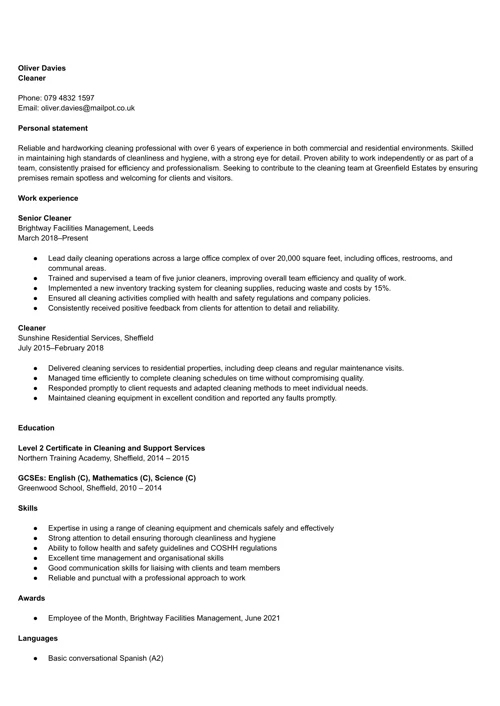 NO
NO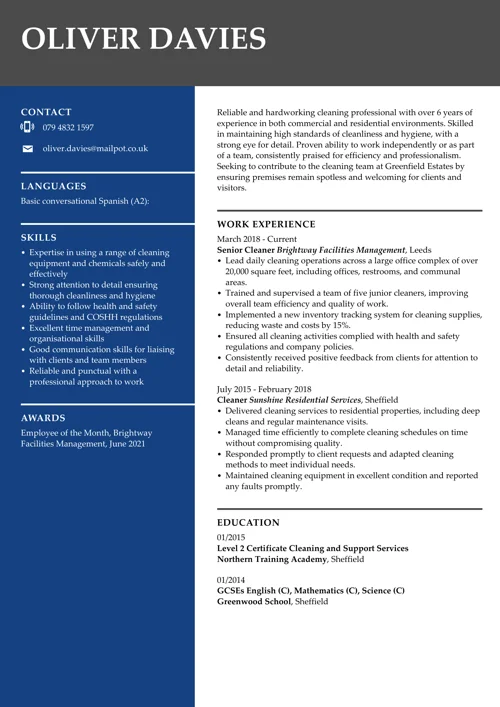 YES
YESOur customers were hired by:
As Artificial Intelligence transforms industries at lightning speed, it’s easy to feel uncertain about your job security. From automated chatbots to machine-learning algorithms, AI is doing more than ever—and it’s leaving many workers wondering: what’s left for humans?
However, there are still many roles that depend on human judgement, creativity, and empathy—qualities that outshine what AI can offer. Whether you’re changing careers or just need peace of mind, this list of 12 jobs AI won’t replace in 2025 will show you where the human touch still matters most.
Create an effective CV in minutes. Choose a professional CV template and fill in every section of your CV in a flash using ready-made content and expert tips.
Create a professional CV now!
 NO
NO YES
YESWe created the sample on the right using our builder. See other good CV examples like this one.
Curious to explore more AI-related articles? Have a look at these:
Top studies, such as those by the Institute for Public Policy Research (IPPR) warn that up to 8 million UK jobs could be at risk from AI in the coming years, particularly those involving routine and repetitive work. Yet, there are still many jobs that depend on complex human qualities. Specifically, occupations rooted in creativity, critical thinking, emotional intelligence, empathy, and adaptability can’t be replaced by AI.
Here’s a detailed look at 12 jobs AI is unlikely to replace in the UK this year.
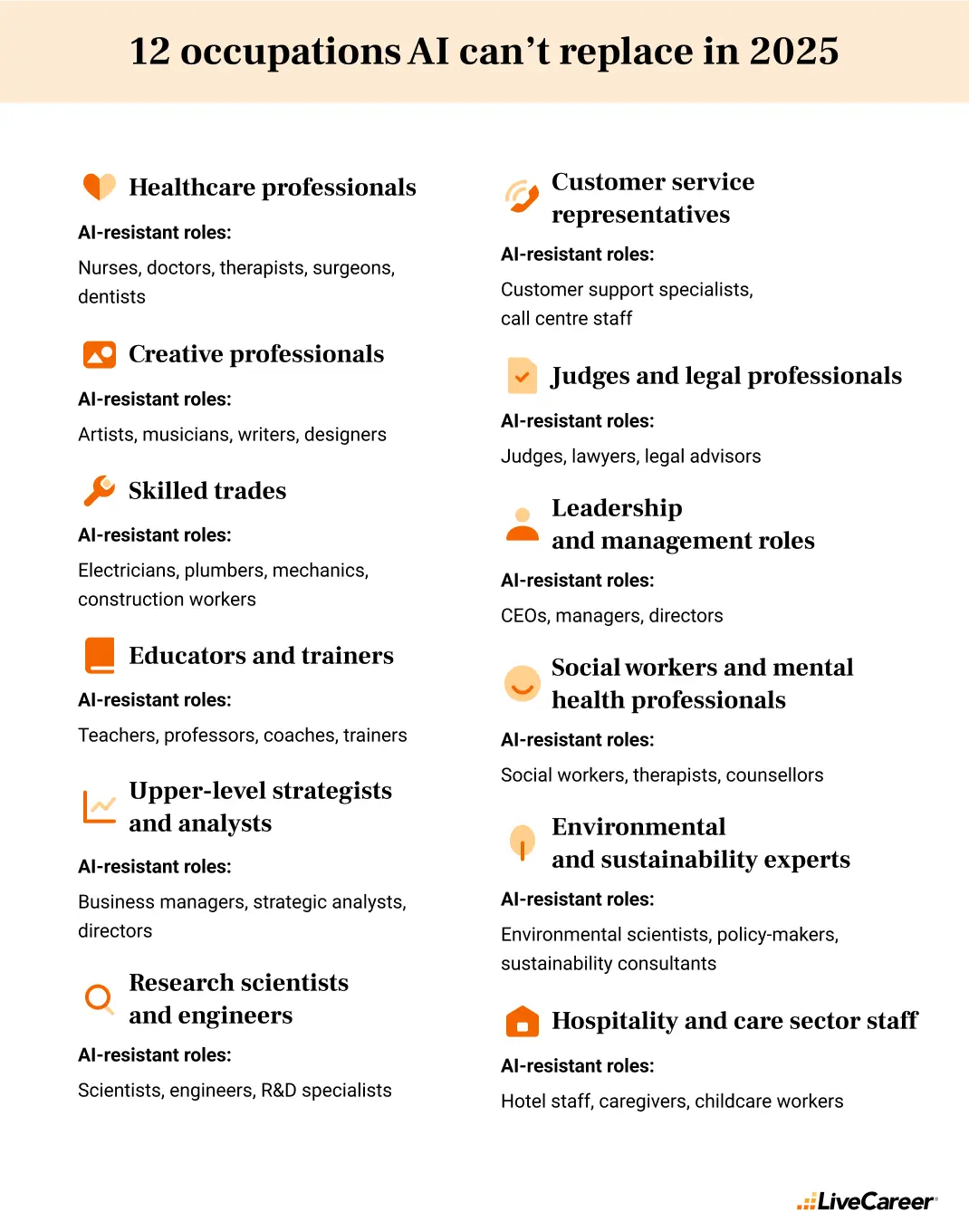
Direct patient care depends on empathy, judgment, and adaptability, and these qualities are beyond any algorithm’s reach. While AI can help with diagnostic or administrative tasks, the human touch in healthcare is irreplaceable.
Nurses, doctors, therapists, surgeons, dentists
Demand for healthcare roles is projected to grow steadily, with the UK’s National Health Service (NHS) planning to recruit over 50,000 additional nurses by 2025. The automation risk for healthcare roles is estimated to be low, at around 15–20%.
Art, music, design, and storytelling draw from emotional depth, imagery, and innovative, unique thinking. While AI can mimic some styles in writing, images, or video, it cannot grasp the intention, emotion, or originality that drive true artistic expression.
Artists, musicians, writers, designers
The creative sector grew by 9% in UK employment from 2015 to 2022, despite technological advances. The creative industry remains deeply rooted in innovation and expression that are uniquely human. Employers consistently rank creativity and complex problem-solving as top human skills, with over 70% stating these are essential for future jobs.
Construction and skilled trades require hands-on problem-solving in unpredictable situations that robots and AI struggle to manage. Tasks such as servicing complex machinery, installing systems on-site, or handling incidents require physical dexterity, real-time judgment, and great adaptability.
Electricians, plumbers, mechanics, construction workers
Skilled trades, such as electricians, plumbers, and mechanics, show an automation risk as low as 16%. These roles rely on practical experience, strong decision-making, and physical presence, which makes them strongly resilient in the face of technological changes.
Mentorship, emotional support, and guidance in learning are unique human qualities that AI can’t deliver. Human educators adapt to individual student needs, inspire motivation, and create meaningful connections that machines cannot imitate. Moreover, real educators and mentors can read emotions, offer encouragement, and adapt teaching methods, which is crucial for effective learning.
Teachers, professors, coaches, trainers
Teaching and training roles have about a 19% automation risk. AI can assist with tasks such as grading or tailoring content, but the relational and developmental aspects of education still rely on people. It takes a human touch to build trust, encourage curiosity, and support a student’s growth over time.
Strategic planning, critical thinking, and interpreting complex business problems and situations go far beyond the current capabilities of even advanced AI. These tasks require context, experience, and a deep understanding of human factors that machines simply don’t possess.
Business managers, strategic analysts, directors
The demand for digital strategists and innovation managers is expected to grow, with an estimated risk of automation below 25%. Companies are seeking individuals who can help bridge the gap between technology and business goals, ensuring that AI is used ethically and efficiently.
Good research is characterised by curiosity, scientific intuition, and adaptability, especially when its outcomes are unclear. These qualities inspire scientists and engineers to explore new ideas, design experiments, and solve complex problems in ways that AI can’t.
Scientists, engineers, R&D specialists
The UK government is investing heavily in STEM research and AI-related jobs, recognising their resilience and growth potential. These roles face a risk of less than 20% automation, due to the need for scientific intuition and creative problem-solving.
A strong CV summary will convince the recruiter you’re the perfect candidate. Save time and choose a ready-made personal statement written by career experts and adjust it to your needs in the LiveCareer CV builder.
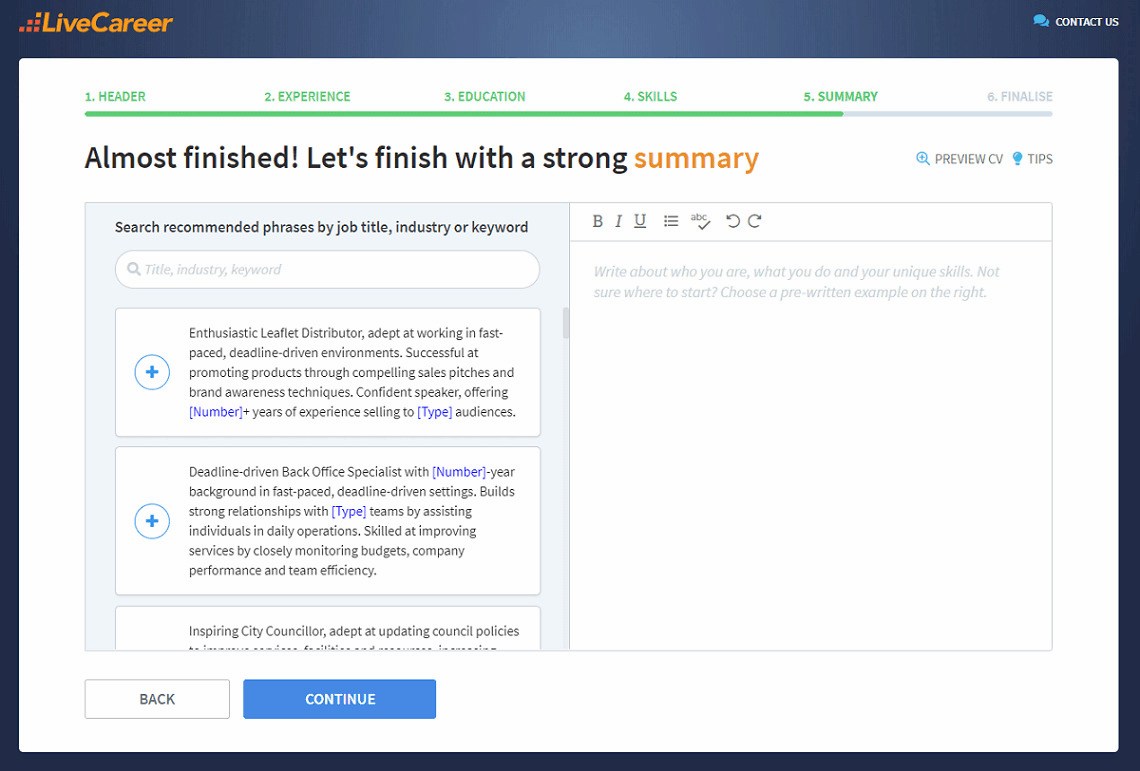
Human agents excel at managing tense situations, showing empathy, and solving unique problems that AI chatbots can’t handle. They understand emotions, show empathy, listen attentively, and respond with genuine care, which makes a real difference in customer interactions and fosters lasting satisfaction.
Customer support specialists, call centre staff
The UK customer service sector employs over 2 million people and is one of the largest service industries, with low automation risk for roles involving emotional intelligence. While chatbots handle routine questions, when it comes to complex or sensitive issues, a human touch is still needed, especially in service-driven industries in the UK.
Interpreting laws, evaluating intent, and ensuring fairness demand context, moral judgement, and a deep understanding of human behaviours. Legal cases often involve specific circumstances where precedent, empathy, and ethical considerations matter with equal weight. This is something that algorithms are unable to handle.
Judges, lawyers, legal advisors
Legal professions have automation risks under 25%, as critical interpretation of laws, moral judgement, and advocacy involve significant human input. Even if documentation and research become fully digitised, critical decisions remain better made by people, who combine logical thinking with intuition more effectively than AI. Legal processes rely on advocacy, negotiation, and courtroom dynamics—aspects where human relationships and discretion are core.
Most outstanding leaders inspire, motivate, and guide teams through change and innovation. They rely on emotional intelligence and nuanced communication. Managing people also involves making judgement calls in uncertain situations and cultivating an organisational culture—qualities uniquely human.
CEOs, managers, directors
Emotional intelligence, conflict resolution, and natural relationship-building skills are becoming even more valuable in the age of AI. That’s why automation risk for senior management remains low, at around 15%. The ability to navigate workplace dynamics and inspire trust is essential, regardless of the number of digital tools available.
Roles such as social workers or mental health specialists involve deep trust, emotional support, and complex human interactions, all of which are beyond the capabilities of machines. Promising social work and therapy depend on building rapport, reading non-verbal cues, and tailoring interventions to individual clients—a level of personalisation AI cannot achieve.
Social workers, therapists, counsellors
UK policy suggests protecting these roles, as they’re deeply human and vital for the well-being of society. Jobs that involve crisis support, safeguarding vulnerable individuals, and promoting mental health rely heavily on empathy, judgment, and human connection. Consequently, they face some of the lowest automation risks, at around 10 to 15%.
Adapting to environmental changes, sustainability planning, and community engagement depend on local expertise and creative problem-solving. These professionals translate complex data and scientific findings into actionable policy, which often requires negotiation and consensus-building among diverse stakeholders.
Environmental scientists, policy-makers, and sustainability consultants
Green jobs are a key policy focus and are expected to continue growing despite risks posed by automation in other sectors. Roles such as environmental scientists and sustainability consultants are expanding at a rate of over 10% per year in the UK. The country’s commitment to net-zero and sustainable growth fuels demand for experts who can tackle challenges that combine science, economics, and community values.
Personalised service, hospitality, and care work rely on emotional connection, quick thinking, and adaptability. Guests and clients expect genuine warmth, an anticipation of their needs, and the ability to handle unpredictable situations—uniquely human attributes.
Hotel staff, caregivers, childcare workers
These sectors make a significant contribution to the UK’s human-centred economy and carry a low automation risk of less than 20%. Strong interpersonal skills, trust-building, and cultural sensitivity are crucial in these roles, making automation an unlikely substitute.
While AI is significantly changing the UK job market, machines will never fully outperform humans in specific ways. The roles I’ve highlighted in this article depend on creativity, empathy, judgment, and adaptability, which are the qualities that technology still can’t match.
In contrast, jobs most at risk from automation tend to be routine and task-based. Clerical and secretarial jobs, such as cashiers, data entry clerks, administrative assistants, or bank tellers, are expected to see the most significant declines, as they are the most exposed to AI influences. For example, jobs like electricians have only a 16% probability of automation, and teaching has just a 19% risk due to the essential human interaction involved.
For UK workers facing AI-related job market changes, the most significant opportunities will belong to those who develop and refine distinctly human skills, adapt to emerging technologies, and commit to continuous learning. If you’re one of them, focus on roles where the human touch matters most, so you can not only future-proof your career but also find meaning in work that positively influences lives and communities.
You don’t have to be a CV writing expert. In the LiveCareer CV builder you’ll find ready-made content for every industry and position, which you can then add with a single click.

Thank you for reading this article on 12 jobs AI won’t replace in 2025. I hope it has given you clarity and confidence about where your skills can truly shine in an evolving job market.
Our editorial team has reviewed this article for compliance with LiveCareer’s editorial guidelines. It’s to ensure that our expert advice and recommendations are consistent across all our career guides and align with current CV and cover letter writing standards and trends. We’re trusted by over 10 million job seekers, supporting them on their way to finding their dream job. Each article is preceded by research and scrutiny to ensure our content responds to current market trends and demand.
About the author
Marta is a certified career expert with a marketing edge, offering strategic guidance to job seekers at every stage. She creates standout CVs and cover letters that help them land opportunities with confidence.
Rate this article:
Jobs ai wont replace
Average:
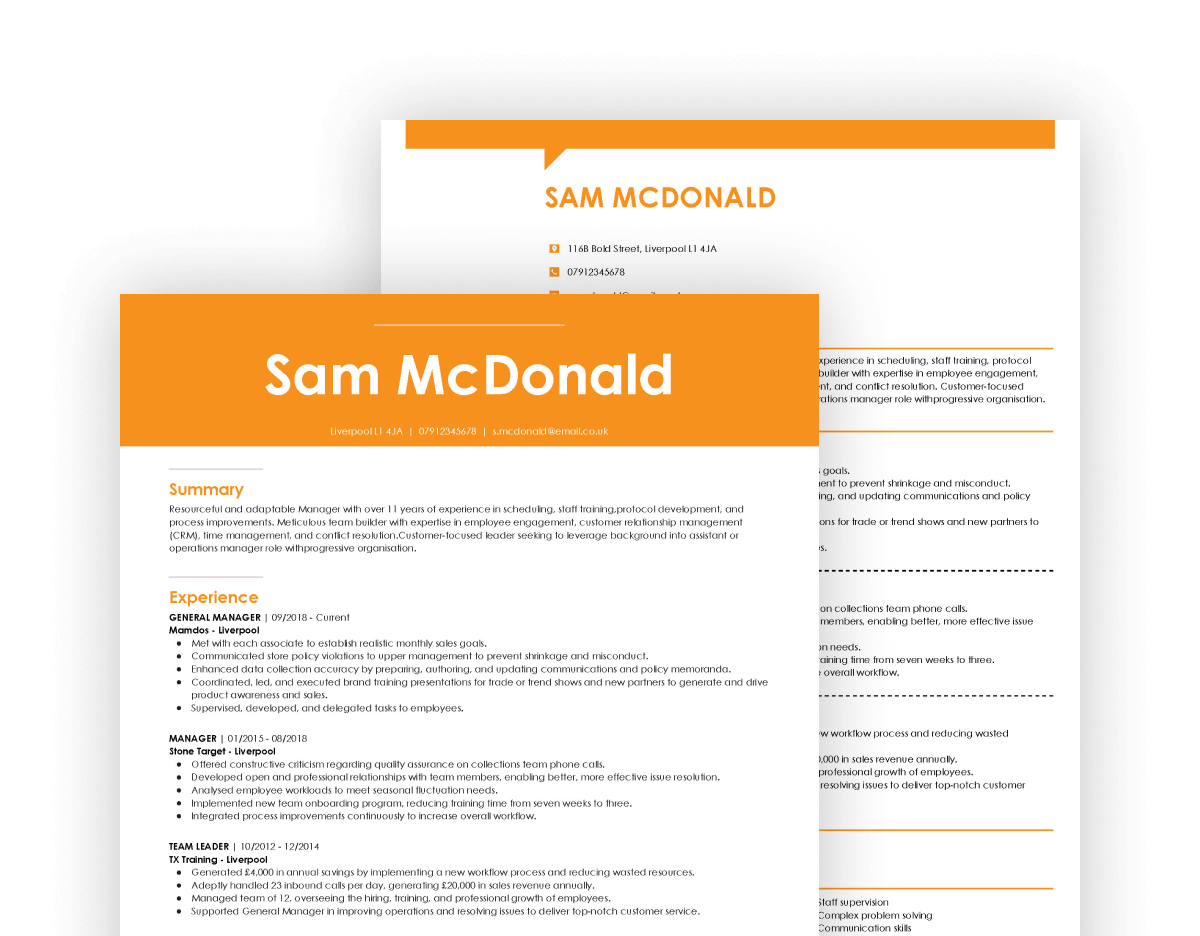

Learn how to write a CV in a few steps. Make a good CV for the UK job market following a dedicated CV template, expert tips, and examples.

Hard to decide on the right CV format? View these best UK CV format examples, see how to format a CV, and turn all the ideas into concrete actions.

What does a CV stand for? Read our comprehensive guide and learn the CV meaning compared to a resume meaning. No more asking “What’s a CV?” since now.
Our customers were hired by: